Reallab
Mobile Blue–Green Infrastructure (BGI)
Mobile blue–green infrastructure realises the circular city.
Phase I (2019–2022): Two prototypes for resource– and space–saving urban food production and climate regeneration with locally treated shower or rainwater.
Urban gardens and parks are important for the urban climate, biodiversity and quality of life of people living in cities. How can the ecosystem services they provide be recorded and included in urban policy consideration decisions so that urban land management becomes more sustainable?
In the Garden Services project, researchers work together with practitioners in real laboratories and with the help of survey studies to record the diverse services of gardens and parks for urban society and derive recommendations for action for cities and civil society actors.
In Phase I, public parks and community places and gardens such as the BEACH 61 facility in Berlin‘s Gleisdreieckpark served as a “blueprint“ for the mobile transferability and flexible, creative integration of eco–technical module sets for combined water, farm and biodiversity management.
How can rainwater or shower water be made usable in a participatory and productive way? How, how much and in what quality can edible greenery, biodiversity and a pleasant urban climate be re–produced from it? And how can the mobile blue–green infrastructures be both prototypes and catalysts for circular and climate–friendly urban development? In the first project phase of GartenLeistungen, two prototypes for vertical farming with recycled rainwater or shower water were created in the himmelbeet and in the Park am Gleisdreieck. At the Gleisdreieck site, the team also developed mobile reed beds that have a cooling effect through their evaporation capacity and, similar to a “mini–moor“, fulfil important sponge functions for local water and material retention.
Questions of design and technical feasibility, of operation and maintenance, and of mapping blue–green ecosystem services were researched in a participatory manner as part of the interdisciplinary, practice–oriented teaching at the TU Berlin and as a living real–lab process through hands–on actions, user workshops and participatory workshops.
In doing so, the team also drew on the research results and practical experience of highly productive lightweight farming on or at the building using aquaponics, hydroponics combined with water recycling in the neighbourhood (grey water, rainwater) from the Roof Water–Farm project.
Phase II (2022–2024): Continuation and multiplication of the farming and climate modules – “School makes climate!” and “Design climate parklets!”
In the implementation and continuation phase, the StadtManufaktur of the TU Berlin continues to develop the “Mobile blue–green infrastructure“ real laboratory. The focus is on the participatory–structural multiplication of the mobile reed beds with local evaporation and sponge function according to the motto “Making climate together“. Through targeted cooperation with schools and educational institutions, these climate modules and the vertical farming modules are to be linked with educational offers. Practical knowledge and skills are incorporated into learning formats and materials and show ways towards an edible and sponge city. The first participatory school in the “Klima macht Schule“ real laboratory is the Max–Planck–Gymnasium in Berlin–Mitte.
In cooperation with himmelbeet, the real lab “Designing Climate Parklets“ is also taking place: Here the team is researching how the principle of the “evaporation bed“ can be successfully transferred to parklets. A parklet is a piece of street furniture with planters, sometimes also with seating, that is allowed to occupy a public parking space after successful approval. In this way, parklets promote green spaces close to homes for climate–adapted cities.
Thematic approaches:
#WaterInfrastructure #ProductiveCity #CircularCity #Farming #EcosystemServices #ClimateMaking.
Spatial approaches:
#Open Spaces #Mobile #Modular #Vertical
Partners / Alliances – Phase I (2019–2022):
Grün Berlin, Himmelbeet, Terra Urbana GmbH, TU Berlin – FG Städtebau und Siedlungswesen , Institute for Ecological Economy Research (IÖW).
Partners / Alliances – Phase II (2022–2024):
Himmelbeet, TU Berlin – StadtManufaktur, Institute for Ecological Economy Research (IÖW), Max–Planck–Gymnasium Berlin.
Contact: Dr.-Ing. Grit Bürgow, StadtManufaktur c/o Staff Office Science & Society, Email: grit.buergow@tu–berlin.de
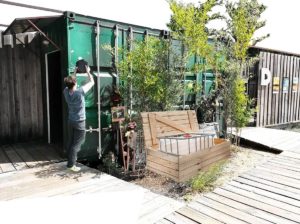
Outdoor shower system of Beach61 with mobile shower water treatment, here first visualisation of the “water box“. Photo & graphic: Grit Bürgow, Tim Nebert
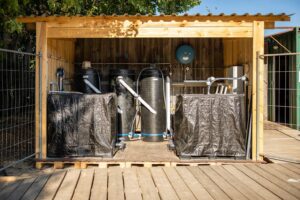
Implemented “water box“ for local shower water/ grey water treatment into service water and irrigation water. Partner: Terra Urbana, Lokus GmbH. Photo: Felix Noak
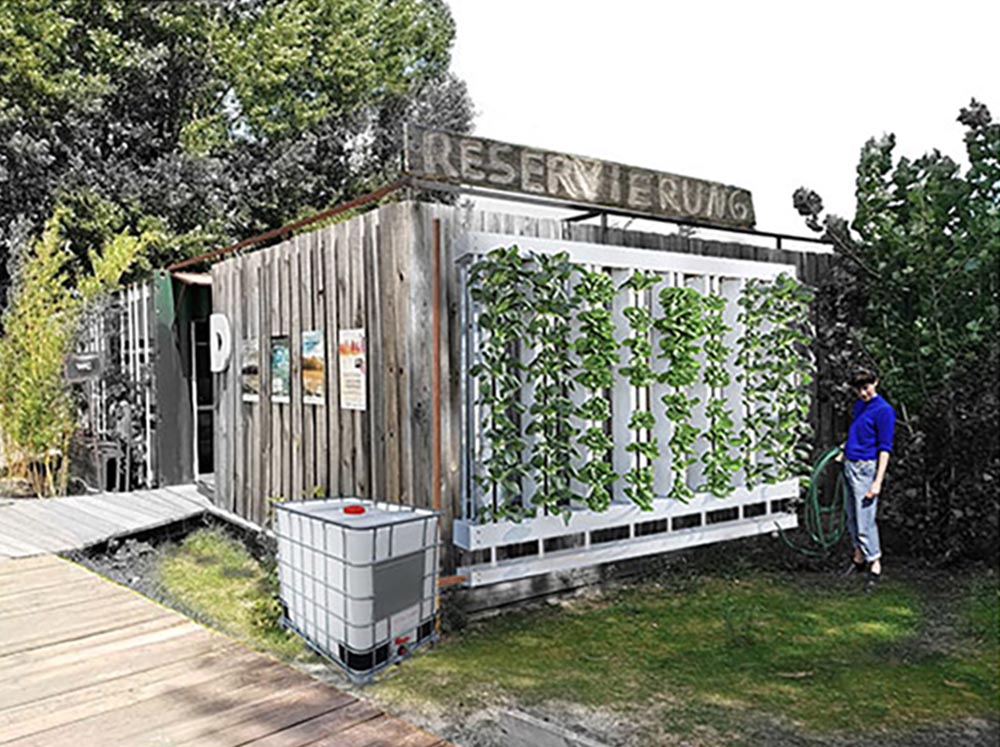
Visualisation hydroponic vertical farm for the ultra–local production of salads, herbs and leafy vegetables and for direct consumption at the Beach61 bar or beach bistro, irrigated with locally treated shower water. Photo & graphics: Grit Bürgow, Tim Nebert
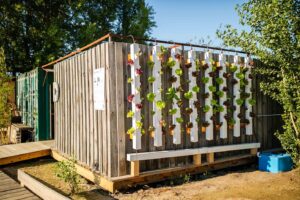
Realised blue–green farming module: First prototype of the hydroponic vertical farm “Shower–Tower“. Photo: Felix Noak, TU Berlin
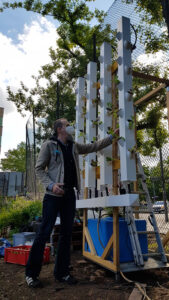
Construction of the second vertical farm on the former site of himmelbeet in Ruheplatzstrasse in Berlin–Wedding. The “Rain Shower Tower“ is powered by rainwater collected from the roof of the community garden café and was configured as a solitary plant tower. Photo: Andreas Horn

Realised blue–green climate modules as “mobile reed beds“, irrigated with treated shower water for more evaporative cooling, natural water storage, biodiversity and feel–good atmosphere in the city! Real–lab workshop at the Beach 61 site in Berlin‘s Gleisdreieckpark on 07.07.2020. Photo: Grit Bürgow

Leave A Comment
You must be logged in to post a comment.